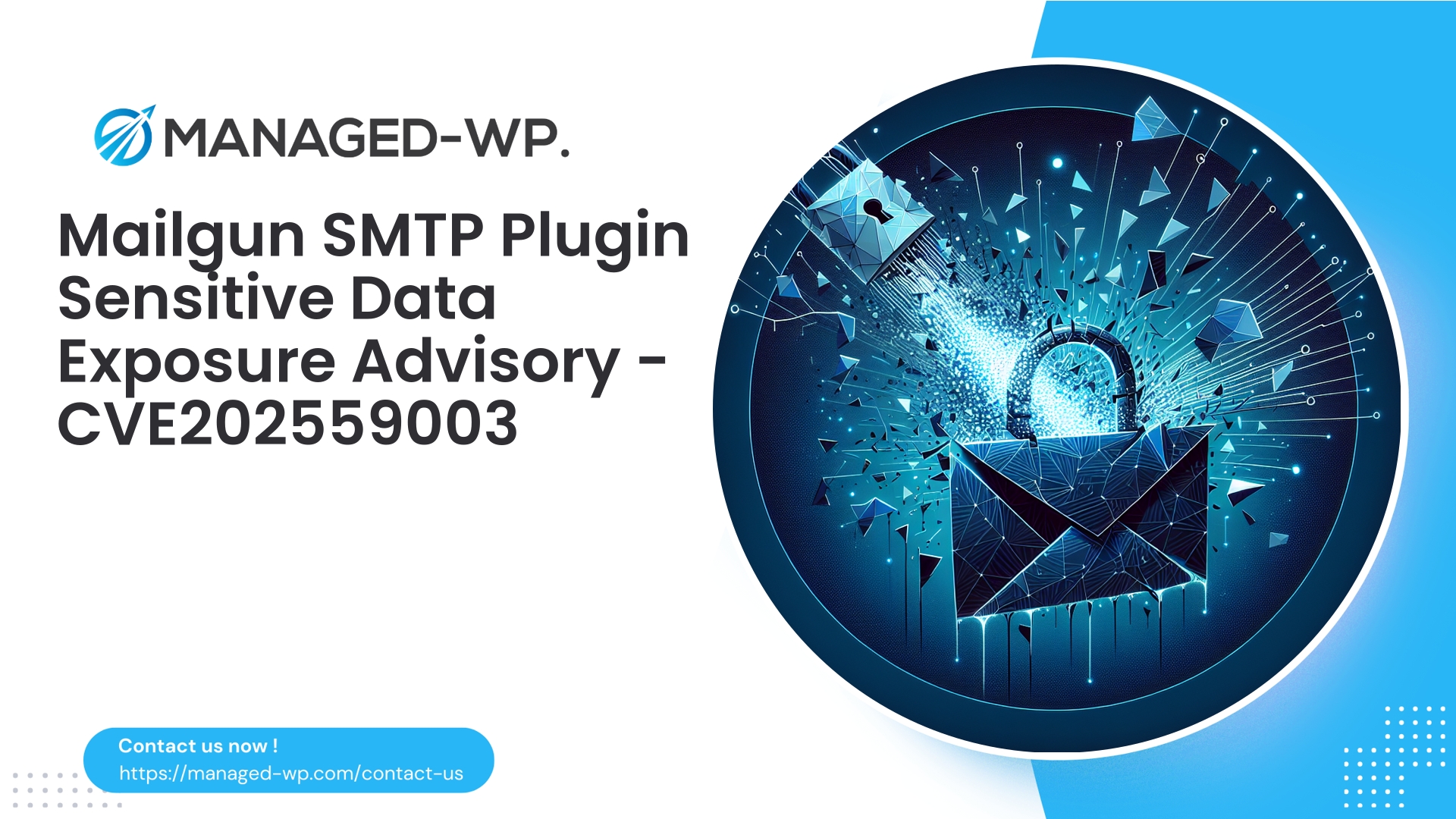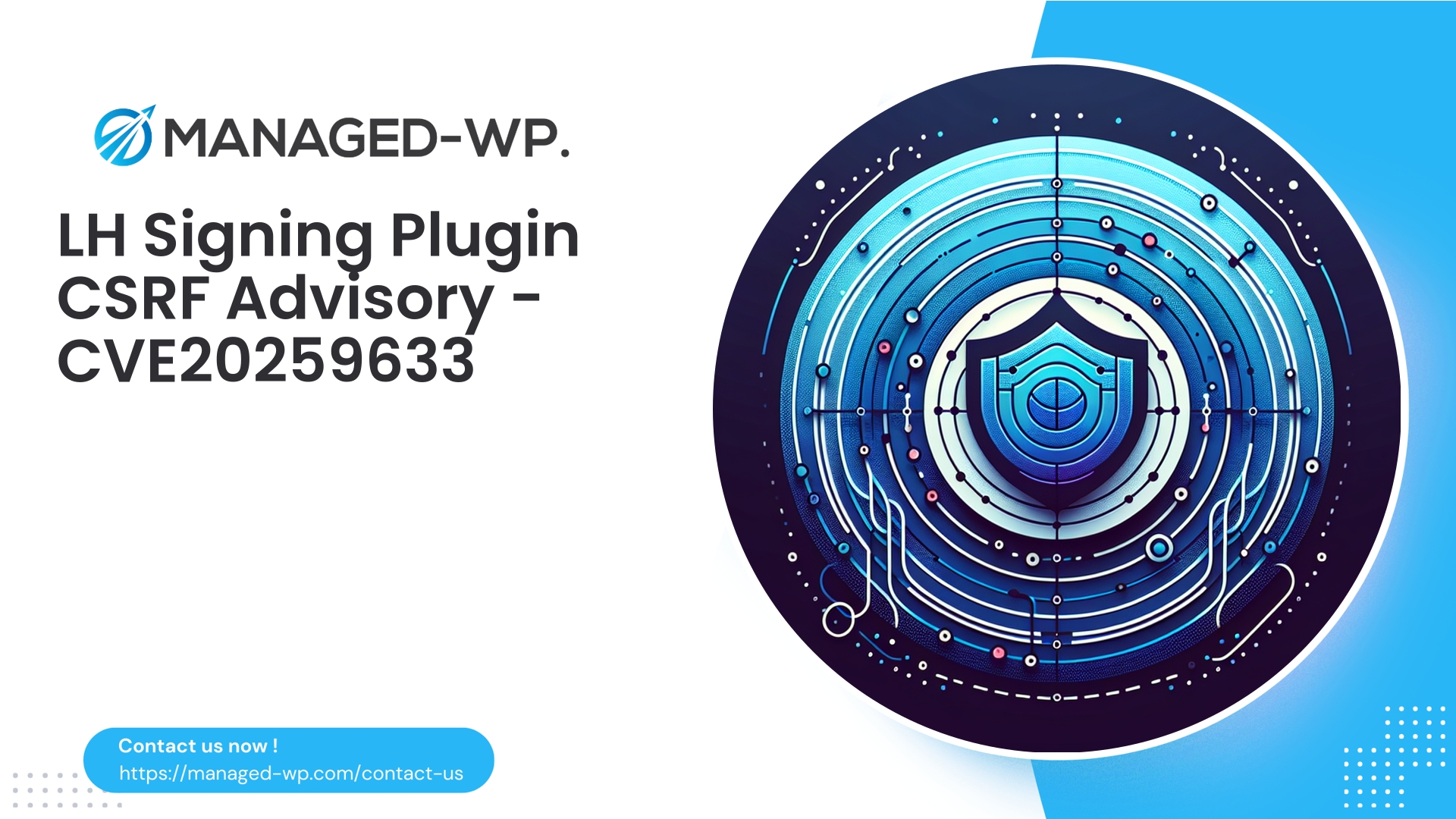| 插件名稱 | WP Mailgun SMTP |
|---|---|
| 漏洞類型 | 敏感資料外洩 |
| CVE編號 | CVE-2025-59003 |
| 緊急 | 低的 |
| CVE 發布日期 | 2025-09-12 |
| 來源網址 | CVE-2025-59003 |
緊急安全公告:WP Mailgun SMTP(<= 1.0.7)— 敏感資料外洩 (CVE-2025-59003)
來自 Managed-WP 安全專家的全面分析和緩解指導
2025年9月12日,WP Mailgun SMTP WordPress外掛(版本≤1.0.7)被揭露有一個嚴重漏洞,官方編號為CVE-2025-59003。此漏洞由於存取控制不當,會導致敏感資訊洩露,被歸類為敏感資料外洩(符合OWASP A3標準),CVSS評分為5.8。至關重要的是,該漏洞無需身份驗證即可被利用,從而危及您網站的機密配置和憑證。目前,原供應商尚未發布針對受影響版本的補丁。
在 Managed-WP,我們已對該漏洞進行了全面審查,並編寫了這份詳細的安全建議。我們的目標是為 WordPress 網站所有者、管理員、開發人員和安全團隊提供切實可行的緊急措施,以評估和降低風險。本文結合了策略性見解和實用措施,旨在立即降低風險敞口,並持續加強安全防護。
摘要(TL;DR)
- 受影響的插件: WP Mailgun SMTP for WordPress
- 易受攻擊的版本: 包括 1.0.7 及更早版本在內的所有版本
- 漏洞類型: 透過未經身份驗證的存取洩露敏感數據
- CVE標識符: CVE-2025-59003
- 嚴重程度: 中低風險(CVSS 5.8),但由於敏感 API 金鑰和憑證洩露,風險較高
- 官方修復方案: 目前暫無可用資訊;該插件似乎已停止維護。
- 建議採取的措施: 立即移除或取代插件,輪換所有受影響的憑證(Mailgun API 金鑰、SMTP 密碼),部署 Web 應用程式防火牆 (WAF) 規則以虛擬修補漏洞點,審核是否有入侵跡象,監控日誌,並準備進行全面的安全審查。
- Managed-WP 諮詢: 如果無法立即移除,請立即實施我們建議的 WAF 規則,並遵循本公告中的事件回應清單。
威脅情勢:為何此漏洞需要您關注
雖然「敏感資料外洩」漏洞可能不像遠端程式碼執行漏洞那樣迫在眉睫,但它們帶來的風險卻相當大。具體到 WP Mailgun SMTP 而言:
- 洩漏的 Mailgun API 金鑰和 SMTP 憑證使攻擊者能夠發送未經授權的電子郵件,從而導致網路釣魚活動、垃圾郵件傳播、聲譽損害以及潛在的網域黑名單。
- 配置和使用者元資料的洩漏會助長在您的 WordPress 環境中進行社會工程攻擊、橫向移動或權限提升。
- 取得管理令牌可以授予持久的後門存取權限,透過資料外洩或系統操縱進一步加劇損害。
- 由於利用漏洞無需身份驗證,威脅行為者可以透過對網路進行自動掃描,同時攻擊多個網站。
最終,真正的影響取決於您對插件的使用情況和儲存的資料。如果 Mailgun 為您的網站提供關鍵的電子郵件流程支持,那麼此漏洞將嚴重損害您的營運安全性和品牌信譽。
攻擊途徑:了解此漏洞是如何被利用的
WordPress 外掛程式中敏感資料外洩漏洞通常源自於:
- 公開可存取的管理端點或 AJAX 處理程序在未驗證使用者授權的情況下洩漏設定資料。
- 未經身份驗證的 REST API 路由或插件檔案會洩漏敏感選項或儲存的金鑰,以回應精心建構的 HTTP 請求。
- 以明文形式將 API 金鑰或密碼儲存在可透過直接 URL 請求存取的文件中。
- 調試日誌、匯出端點或相關敏感端點的保護不足。
已披露的 CVE-2025-59003 詳細資訊表明存在未經身份驗證的訪問,這與攻擊者探測插件端點而可能自動批量提取密鑰的情況相符。
重要的: Managed-WP 不會發布漏洞利用程式碼或要求詳細資訊以防止濫用。我們專注於保護您的環境並實現快速有效的緩解措施。
立即事件回應:逐步檢查清單
如果您的 WordPress 網站運行的是 WP Mailgun SMTP 1.0.7 或更低版本,請立即執行以下操作:
- 識別並確認安裝
- 透過 WordPress 控制面板或 CLI 查看您的外掛程式庫存(
wp 插件列表)確認是否存在以及版本。 - 找到儲存在伺服器或外掛程式設定中的 Mailgun 相關憑證。
- 透過 WordPress 控制面板或 CLI 查看您的外掛程式庫存(
- 輪換所有憑證
- 立即撤銷網站使用的所有現有 Mailgun API 金鑰,並產生新的金鑰。
- 變更插件或相關整合儲存或使用的 SMTP 使用者名稱和密碼。
- 在存取這些憑證的輔助整合或 CI/CD 管道中,輪換任何相關的金鑰。
- 僅在移除有漏洞的外掛程式或部署 WAF 緩解措施後才更新設定。
- 隔離或移除插件
- 如果可能,請完全卸載 WP Mailgun SMTP 並刪除其外掛目錄(
wp-content/plugins/wp-mailgun-smtp/). - 如果無法立即移除,請停用該外掛程式以防止程式碼執行。請注意,如果文件仍然可以訪問,則此方法可能無法消除所有攻擊面。
- 如果可能,請完全卸載 WP Mailgun SMTP 並刪除其外掛目錄(
- 實作 Web 應用程式防火牆 (WAF) 虛擬補丁
- 部署規則可阻止所有未經驗證的請求存取與外掛程式相關的端點、檔案和 REST 路由。
- 應用速率限制和 IP 信譽過濾來減少掃描和暴力破解嘗試。
- 監控WAF日誌,查看是否有任何攻擊嘗試模式。
- 掃描是否有妥協
- 對網站進行徹底掃描,檢查是否有可疑的文件變更、未知的管理帳戶、未經授權的排程任務和異常的電子郵件活動。
- 仔細檢查伺服器日誌和 Mailgun 出站日誌,查看是否有被攻擊的跡象。
- 恢復並加固您的環境
- 如果偵測到安全漏洞,請將網站下線,並從乾淨的備份中恢復,然後再恢復生產環境。
- 確保配置已加強,移除不必要的插件,並啟用 WAF 保護。
- 更換插件
- 過渡到維護良好、安全的 SMTP 外掛程式或整合方法,遵循金鑰管理和存取控制的最佳實務。
取證與日誌:如何偵測漏洞利用
- 透過 Mailgun 或您的 SMTP 提供者監控外寄郵件量的突然激增或異常情況。
- 調查新增或修改的 WordPress 管理員帳號或異常權限提升行為。
- 審核檔案系統和資料庫,檢查插件目錄和設定是否有意外變更。
- 仔細檢查伺服器存取日誌,尋找針對 WP Mailgun SMTP 外掛程式檔案或包含「mailgun」關鍵字的 AJAX 和 REST API 呼叫的可疑請求。
- 檢查 cron 排程任務和伺服器作業,尋找與外掛程式相關的陌生項目。
- 檢查錯誤和偵錯日誌,尋找顯示端點或洩漏資料路徑的追蹤資訊。
推薦的 WAF 虛擬補丁規則
當廠商提供的補丁不可用時,應用WAF規則可以透過關閉主要攻擊途徑提供關鍵保護:
- 阻止直接存取插件文件
- 封鎖對任何符合 URI 的未經驗證的 HTTP 請求
^/wp-content/plugins/wp-mailgun-smtp/.*.
- 封鎖對任何符合 URI 的未經驗證的 HTTP 請求
- 限制管理員 AJAX 操作
- 拒絕未經身份驗證的請求
admin-ajax.php包含與 Mailgun 相關操作相符的查詢參數,例如:操作=郵件槍*.
- 拒絕未經身份驗證的請求
- 安全的 REST API 端點
- 阻止針對包括 Mailgun 插件模式在內的路由的匿名 REST 調用,例如
/wp-json/wp-mailgun-smtp/.
- 阻止針對包括 Mailgun 插件模式在內的路由的匿名 REST 調用,例如
- 洩漏秘密的內容檢查
- (可選)檢查傳出的 JSON/XML 回應中是否存在 API 金鑰模式,並封鎖或記錄可疑事件。
- 應用速率限制和機器人防護
- 限制來自單一 IP 位址的重複請求,並封鎖已知的惡意 IP 位址。
- IP位址和地理位置限制(如適用)
- 根據受信任的 IP 位址範圍限制對管理端點的存取。
- 阻止目錄和檔案瀏覽
- 對關鍵外掛程式 PHP 檔案的直接 HTTP 請求傳回 403 Forbidden 回應。
致 Managed-WP 客戶: 我們已主動為託管WAF服務部署了客製化的虛擬修補程式規則。請立即啟用這些保護措施以降低風險。
安全資格輪替指南
- 透過郵件提供者的管理控制台,立即產生新的 Mailgun API 金鑰和 SMTP 憑證。
- 只有在移除存在漏洞的外掛程式或透過強大的WAF規則保護後,才能部署新的憑證。
- 撤銷舊憑證以防止其進一步濫用。
- 如果懷疑有濫用舊憑證的情況,請通知您的郵件服務供應商,並要求升級調查或採取補救措施。
- 盡可能採用環境變數或金鑰管理工具,而不是將敏感金鑰儲存在外掛選項或明文中。
監測與檢測:需要密切注意哪些方面
- 郵件發送異常,包括退信率上升、垃圾郵件舉報或交易郵件數量異常增加。
- 與管理帳戶相關的登入嘗試失敗或異常權限變更。
- 插件目錄中的檔案完整性警報,特別是意外的檔案新增或修改。
- 可疑的定時任務或 cron 作業正在執行不熟悉的腳本。
- 伺服器向未知 IP 位址發出的出站通訊可能表示存在命令和控制通道。
合理配置警報閾值,以便在出現異常活動時及時觸發人工審核。
如果您發現安全漏洞:立即採取的應對措施
- 將網站下線或啟用維護模式,以防止進一步損害。
- 收集取證資料:收集 Web 伺服器日誌、資料庫快照、檔案系統狀態、執行進程清單和網路連線詳細資訊。
- 完整保留現有資料-分析前避免覆蓋任何內容。
- 立即輪換所有可能暴露的憑證。
- 清理或從入侵前建立的備份中還原網站。
- 重建並加固您的託管環境,確認已關閉被利用的攻擊路徑。
- 實施額外的安全措施以避免未來發生類似事件,包括部署 WAF 和外掛程式管理最佳實務。
如果事件回應資源有限,請考慮聘請專業服務人員。 Managed-WP 客戶可以透過控制面板聯繫我們的安全團隊,以獲得支援和指導。
長期安全最佳實踐
- 立即移除所有已棄用或無人維護的插件。
- 限制並定期輪換儲存的金鑰;盡可能避免以明文形式儲存。
- 對 API 金鑰套用最小權限原則-將權限範圍限制在所需的最小範圍內。
- 透過停用外掛程式編輯器、強制使用強密碼以及在管理帳戶上部署雙重認證來加強 WordPress 本身的安全性。
- 保持核心元件、主題元件和外掛元件的最新狀態。
- 利用能夠快速虛擬修補和進階規則管理的 WAF 解決方案。
- 實施文件完整性監控、集中式日誌記錄、事件偵測和定期安全性稽核。
選擇安全的 SMTP 替代方案
在選擇替代已棄用的 WP Mailgun SMTP 外掛程式時,請優先考慮以下幾點:
- 積極的維護和反應迅速的開發社區。
- 注重安全性的設計,具備強大的金鑰管理和嚴格的存取控制。
- 最大限度地減少管理端點或未經認證的路由的暴露。
- 透明的變更日誌和及時安全更新的追蹤記錄。
常見問題解答
Q:停用插件是否足以消除漏洞?
答:停用插件會阻止插件程式碼執行,但可能無法刪除可透過直接要求存取的檔案或設定資料。徹底刪除並結合 WAF 防護措施更為安全。
Q:我應該立即撤銷所有 Mailgun API 金鑰嗎?
答:是的,尤其是在有漏洞的插件管理這些金鑰的情況下。漏洞修復和環境加固後,應輪換密鑰並進行更新。
Q:我可以繼續安全地使用 Mailgun 的各項功能嗎?
A:以安全、積極維護的替代方案取代存在漏洞的插件,或透過伺服器端安全方法整合 Mailgun,避免洩漏敏感資訊。
Managed-WP 如何保護您的安全
Managed-WP持續監控不斷出現的WordPress漏洞,並迅速採取行動保護我們的客戶。針對WP Mailgun SMTP問題,我們已採取以下措施:
- 開發並部署了客製化的虛擬修補規則,以阻止關鍵的攻擊途徑。
- 已通知受影響的客戶,並提供清晰的補救措施清單。
- 實現了針對插件的掃描和攻擊嘗試的檢測特徵。
- 透過我們的託管安全服務進行持續監控和快速回應。
如有任何疑問或疑慮,客戶可隨時透過其 Managed-WP 控制面板工單系統與我們聯繫。
立即開始:使用 Managed-WP 保護您的網站
如果您需要立即獲得保護或正在評估安全解決方案,請考慮 Managed-WP 的免費保護計劃。它提供關鍵的安全保障,包括:
- 具有可自訂規則集的託管防火牆和網路應用程式防火牆。
- 惡意軟體掃描和防禦措施符合 OWASP 十大風險標準。
- 當官方修復程式不可用時,可透過簡單的虛擬修補程式來阻止漏洞利用嘗試。
點這裡免費註冊: https://my.wp-firewall.com/buy/wp-firewall-free-plan/
最終建議:採取預防措施,保護您的電子郵件基礎設施
雖然不像程式碼注入攻擊那樣引人注目,但像 CVE-2025-59003 這樣的敏感資料外洩漏洞卻暗藏著巨大的風險,它們會導致憑證悄無聲息地洩露,並引發連鎖反應,從而影響您的品牌和業務生存能力。切勿拖延-立即清點受影響的插件,輪換所有金鑰,套用虛擬補丁,並遷移出不支援的軟體。
Managed-WP隨時準備協助您進行漏洞管理和事件回應。請聯絡我們或造訪您的控制台以啟動保護和諮詢服務。
— Managed-WP 安全團隊



















